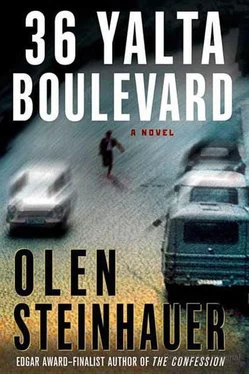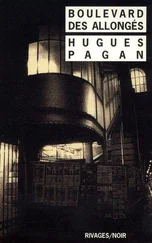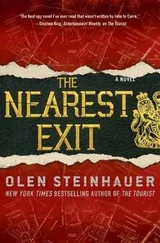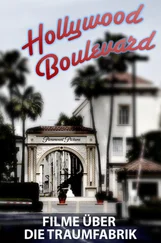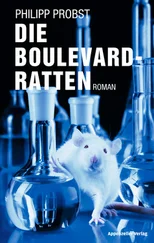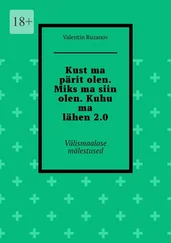Olen Steinhauer - 36 Yalta Boulevard
Здесь есть возможность читать онлайн «Olen Steinhauer - 36 Yalta Boulevard» весь текст электронной книги совершенно бесплатно (целиком полную версию без сокращений). В некоторых случаях можно слушать аудио, скачать через торрент в формате fb2 и присутствует краткое содержание. Жанр: Политический детектив, на английском языке. Описание произведения, (предисловие) а так же отзывы посетителей доступны на портале библиотеки ЛибКат.
- Название:36 Yalta Boulevard
- Автор:
- Жанр:
- Год:неизвестен
- ISBN:нет данных
- Рейтинг книги:3 / 5. Голосов: 1
-
Избранное:Добавить в избранное
- Отзывы:
-
Ваша оценка:
- 60
- 1
- 2
- 3
- 4
- 5
36 Yalta Boulevard: краткое содержание, описание и аннотация
Предлагаем к чтению аннотацию, описание, краткое содержание или предисловие (зависит от того, что написал сам автор книги «36 Yalta Boulevard»). Если вы не нашли необходимую информацию о книге — напишите в комментариях, мы постараемся отыскать её.
36 Yalta Boulevard — читать онлайн бесплатно полную книгу (весь текст) целиком
Ниже представлен текст книги, разбитый по страницам. Система сохранения места последней прочитанной страницы, позволяет с удобством читать онлайн бесплатно книгу «36 Yalta Boulevard», без необходимости каждый раз заново искать на чём Вы остановились. Поставьте закладку, и сможете в любой момент перейти на страницу, на которой закончили чтение.
Интервал:
Закладка:
He looked at her a moment, wondering if he could work his way through that lie as well. No, not with Klara. “I was fired.”
“Fired?” She straightened.
“Yes. I was working in Vienna, and a colleague double-crossed me. He sent in a report claiming that I had tried to sabotage his work. Can I have a cigarette?”
She handed one over and lit another for herself. “Well? Did you?”
“Of course not. I’d never sabotage the Ministry.”
Klara seemed amused, as if this were something she could not quite believe. “You were accused of sabotage and were then given a job in a factory.”
“If I didn’t have allies, I’d be in a work camp now. Not everyone in the Ministry believes this man.”
“Who is this man?”
He stared at the glowing tip of his cigarette. “Someone who wanted to get ahead and didn’t care who he ruined on the way up.”
“And…”
“And?”
“And did he get ahead?”
Brano nodded as he crushed his unfinished cigarette in the ashtray. “It’s an imperfect world.”
“And now you’ve come here.”
“A little vacation.”
“But here,” she said. “Why here? ”
He wasn’t sure what she was getting at. “It’s home.”
“You realize that everyone in town knows about you.”
“What about me?”
“What you do for a living.”
“What I did for a living.”
“It doesn’t matter to them. No one here trusts you.”
“I don’t see why they shouldn’t trust me. My job was only about uncovering the truth.”
She flicked ash off her cigarette. “Come on, Brano. They don’t want to end up another Tibor Kraus.”
“Who?”
“You know. That man from Dukla, the butcher.”
“I don’t know him.”
Klara sighed. “It was in The Spark. He’d been using one of those machines for making meat pies. What are they called?”
“I don’t know.”
“Well, he adjusted the gears so it made them with an ounce less dough. Then he sold the extra dough on the side. Made some money.”
“He was caught?”
She nodded.
“Good.”
“He was executed, Brano. Because of meat pies.” She waited, but he didn’t say a thing. “This is what I mean about the villagers here. You scare them. You know you do. Hell, what you did to Father is almost a legend.”
“I helped him.”
“You’re the only one who believes that, but it doesn’t matter. You know what they think, and that’s why you never visit. It’s not relaxing to be in a place you’re not welcome.”
“So I’m not welcome here?”
“In this house, yes. But in Bobrka…” She waved the smoldering cigarette in a circular motion and let go of her skirt. “Who knows?” She stood up. “We’ll see you tonight?”
When he walked back into the village, the eyes that fell upon him had a different effect than they’d had an hour before. He had known he was not welcome, but Klara saying it aloud had made the idea flesh. A mutt behind a fence barked maniacally at him, and in the eyes of passersby he saw not only a lack of welcome but actual hostility. The old women were musing over how to fit him into their wood-burning ovens, and the men were wondering where on his body a shotgun blast would best end his untrustworthy existence.
The bar in the center was only large enough for three small tables and a short counter. One table was taken up by two old men playing cards on either side of a half-full bottle of rye vodka, and behind the bar a young man with a monobrow beneath his ashy mark bent over a case of Zywiec, counting bottles. Brano waited until he stood up. The recognition flickered and then steadied in the bartender’s eyes. “A beer?”
“Sure,” said Brano.
He removed a warm Zywiec from the box, uncapped it, and slid it over, then returned to his counting.
“And a paper?”
The man looked up. “What?”
“Do you have a copy of The Spark? ”
The bartender took a coffee-stained copy of the day’s paper from behind the counter. “Anything else?”
The two older men took a break in their game to watch Brano sit on a stool by the lace curtains, sip his beer, and begin to read.
On the front page, General Secretary Tomiak Pankov looked back at him from behind a podium in a slender suit, his bald head ringed by a thin patch of gray, talking of peace. When Pankov took power a decade ago, his first preoccupied year had been spent purging the Politburo and security apparatus of anyone too loyal to his dead predecessor, Mihai. Brano had survived that purge by sticking close to Colonel Cerny, whose ability at sidestepping the hammer was almost famous. Once his power was secured, Pankov became what he’d always been, a Party bureaucrat who made speeches on industrial levels and agricultural output; he focused on the numbers. But after a heart attack in early 1965, his focus changed, and he reinvented himself as an enlightened man of peace. The Spark reported that twenty-six nations had been present at the most recent international summit, called “The Doves of Peace”-Pankov was not known for his original titles.
Brano glanced up from the paper and peered out the window; Pavel Jast had arrived.
Comrade Colonel Cerny had given him the name of his contact, shown him a photograph, and added, An idiot, a gambler, and a drunk, but useful. That seemed about right. He could read those characteristics in the swagger Pavel Jast shared with all small-town informants, as if the entire People’s Army were marching behind them and would back up any stupid thing they did. So Brano returned to the paper as the fat man burst in, muttered something indecipherable to the two old men, then clapped a hand on the counter and demanded a vodka. He held the muddy glass to his lips as he rotated, leaning back to survey the tiny space. In the translucent window-reflection, Brano saw Pavel Jast’s eyes settle on him. Jast produced a cigarette and winked at the two old men before approaching.
“Hey, you. Comrade. Got a light?” He winked a second time in the old men’s direction.
From his pocket Brano took a book of matches marked HOTEL METROPOL and handed it to Jast without looking away from the window.
The first match faltered, but the second hissed and sparked until the cigarette was lit. Jast exhaled smoke and the stink of earlier vodkas, and Brano’s eyes watered as he accepted the matches back. But this was a different book of matches, white and blank. Jast said, “From the Capital, eh? Aren’t you Iwona’s boy?”
Brano drank some more beer, then laid a few koronas on the counter. He turned to Jast for the first time and saw the red web of punished veins beneath his flaccid cheeks and nose. “I am,” he said.
Another wink at the old men, who seemed unsure they liked the performance. The bartender ignored everyone. Jast grunted, the shot glass pressing into his chin. “Well, you’re not in the Capital anymore, comrade.”
“I didn’t notice,” said Brano, and only after he left did it occur to anyone in the bar that this had been a joke.
On the way back to his mother’s house, he clutched the matchbook in his pocket, turning it over and opening and shutting it while he watched faces along the road. Zygmunt, the old man who delivered his mother’s bread, seemed to be avoiding his gaze, but Captain Rasko acknowledged him as he stood in the mud with a young woman whose puffy lips made her look like the victim of abuse. He hadn’t expected to come across Lia Soroka out in the open, but he managed the surprise by nodding back at Rasko and at Jan Soroka’s unsmiling wife.
He didn’t take out the matchbook until he had passed his mother’s front door. He flipped it open and read the sweat-smeared pencil scrawl inside the cover:
Читать дальшеИнтервал:
Закладка:
Похожие книги на «36 Yalta Boulevard»
Представляем Вашему вниманию похожие книги на «36 Yalta Boulevard» списком для выбора. Мы отобрали схожую по названию и смыслу литературу в надежде предоставить читателям больше вариантов отыскать новые, интересные, ещё непрочитанные произведения.
Обсуждение, отзывы о книге «36 Yalta Boulevard» и просто собственные мнения читателей. Оставьте ваши комментарии, напишите, что Вы думаете о произведении, его смысле или главных героях. Укажите что конкретно понравилось, а что нет, и почему Вы так считаете.
